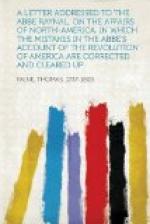“6thly, The said Bill, by holding forth a tender of pardon, implies a criminality in our justifiable resistance, and consequently, to treat under it, would be an implied acknowledgment, that the inhabitants of these States were, what Britain had declared them to be, Rebels.
“7thly. The inhabitants of these States being claimed by them as subjects, they may infer, from the nature of the negotiation now pretended to be set on foot, that the said inhabitants would of right be afterwards bound by such laws as they should make. Wherefore, any agreement entered into on such negociation might at any future time be repealed. And,
“8thly. Because the said Bill purports, that the Commissioners therein mentioned may treat with private individuals; a measure highly derogatory to the dignity of the national character.
“From all which it appears evident to your Committee, that the said Bills are intended to operate upon the hopes and fears of the good people of these States, so as to create divisions among them, and a defection from the common cause, now by the blessing of Divine Providence drawing near to a favourable issue. That they are the sequel of that insidious plan, which from the days of the Stamp-act down to the present time, hath involved this country in contention and bloodshed. And that, as in other cases so in this, although circumstances may force them at times to recede from the unjustifiable claims, there can be no doubt but they will as heretofore, upon the first favourable occasion, again display that lust of domination, which hath rent in twain the mighty empire of Britain.
“Upon the whole matter, the Committee beg leave to report it as their opinion, that as the Americans united in this arduous contest upon principles of common interest, for the defence of common rights and privileges, which union hath been cemented by common calamities, and by mutual good offices and and [sic] affection, so the great cause for which they contend, and in which all mankind are interested, must derive its success from the continuance of that union. Wherefore any man or body of men, who should presume to make any seperate or partial convention or agreement with Commissioners under the Crown of Great Britain, or any of them, ought to be considered and treated as open and avowed enemies of these United States.
“And further your Committee beg leave to report it as their opinion, That these united States cannot, with propriety, hold any conference or treaty with any Commissioners on the part of Great Britain, unless they shall, as a preliminary thereto, either withdraw their fleets and admirals, or else, in positive and express terms, acknowledge the Independence of the said States.
“And inasmuch as it appears to be the design of the enemies of these States to lull them into a fatal security—to the end that they may act with a, becoming weight and importance, it is the opinion of your Committee That the several States be called upon to use the most strenuous exertions to have their respective quotas of continental troops in the field as soon as possible, and that all the militia of the said States be held in readiness, to act as occasion may require.”




